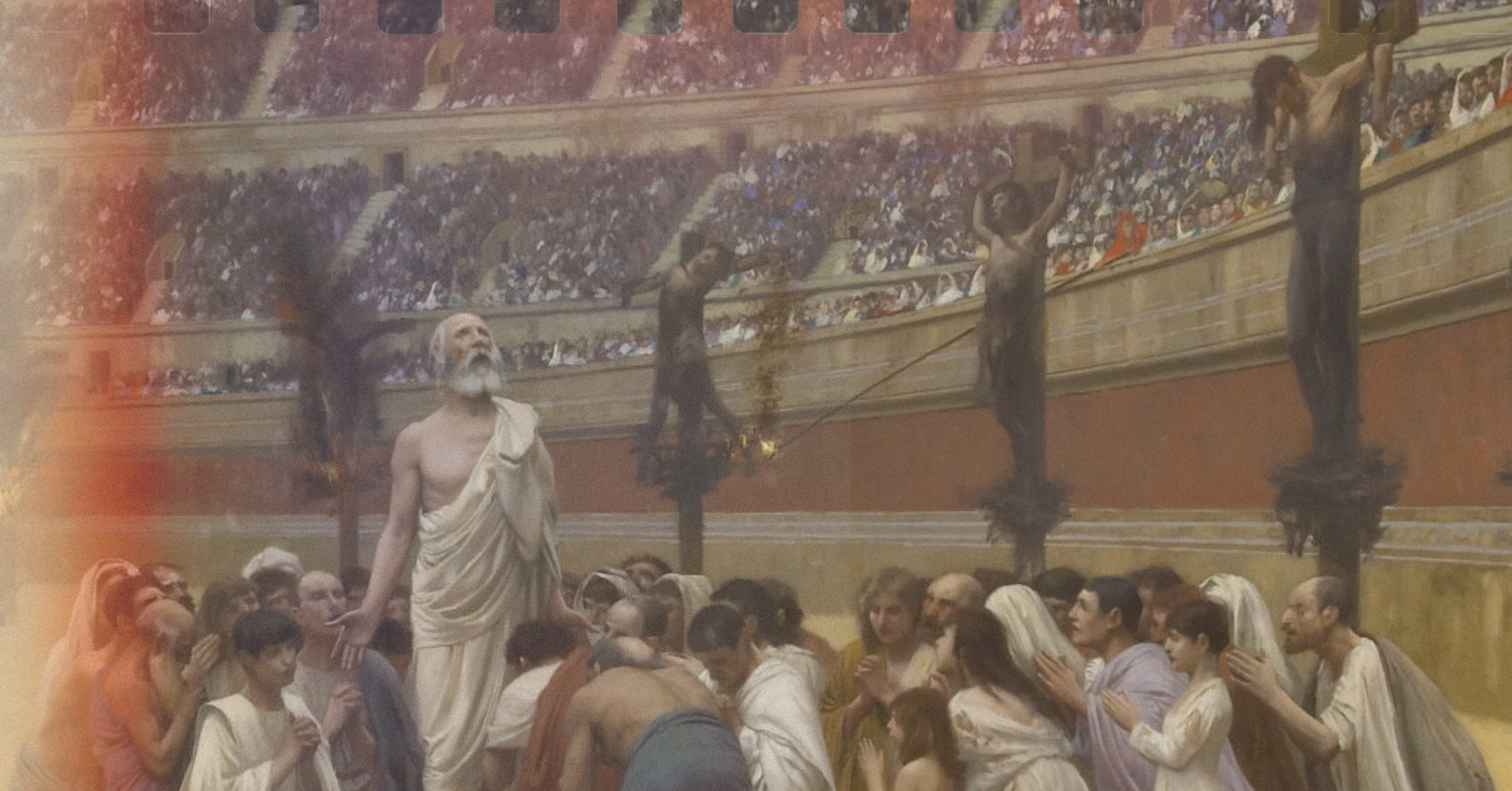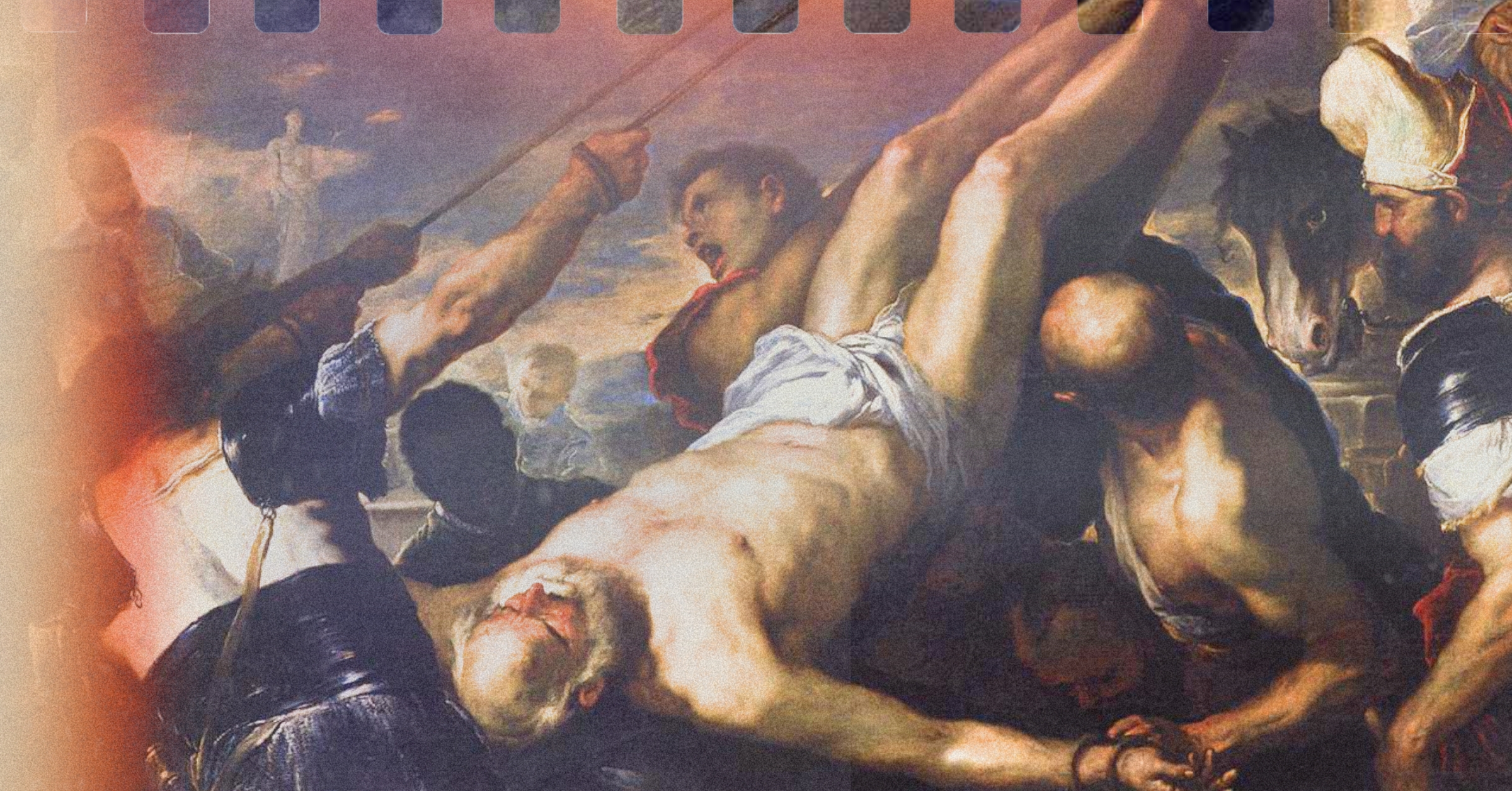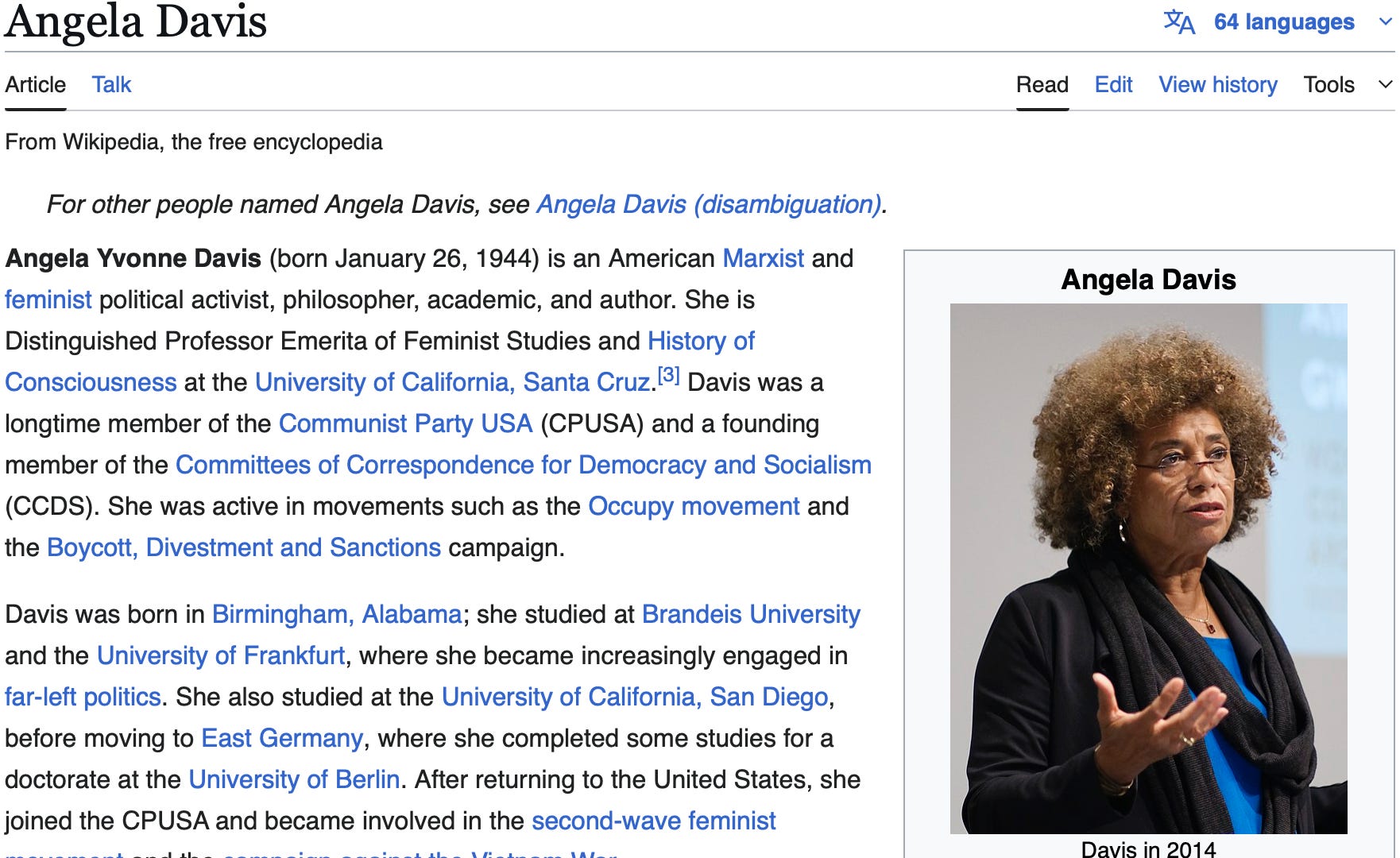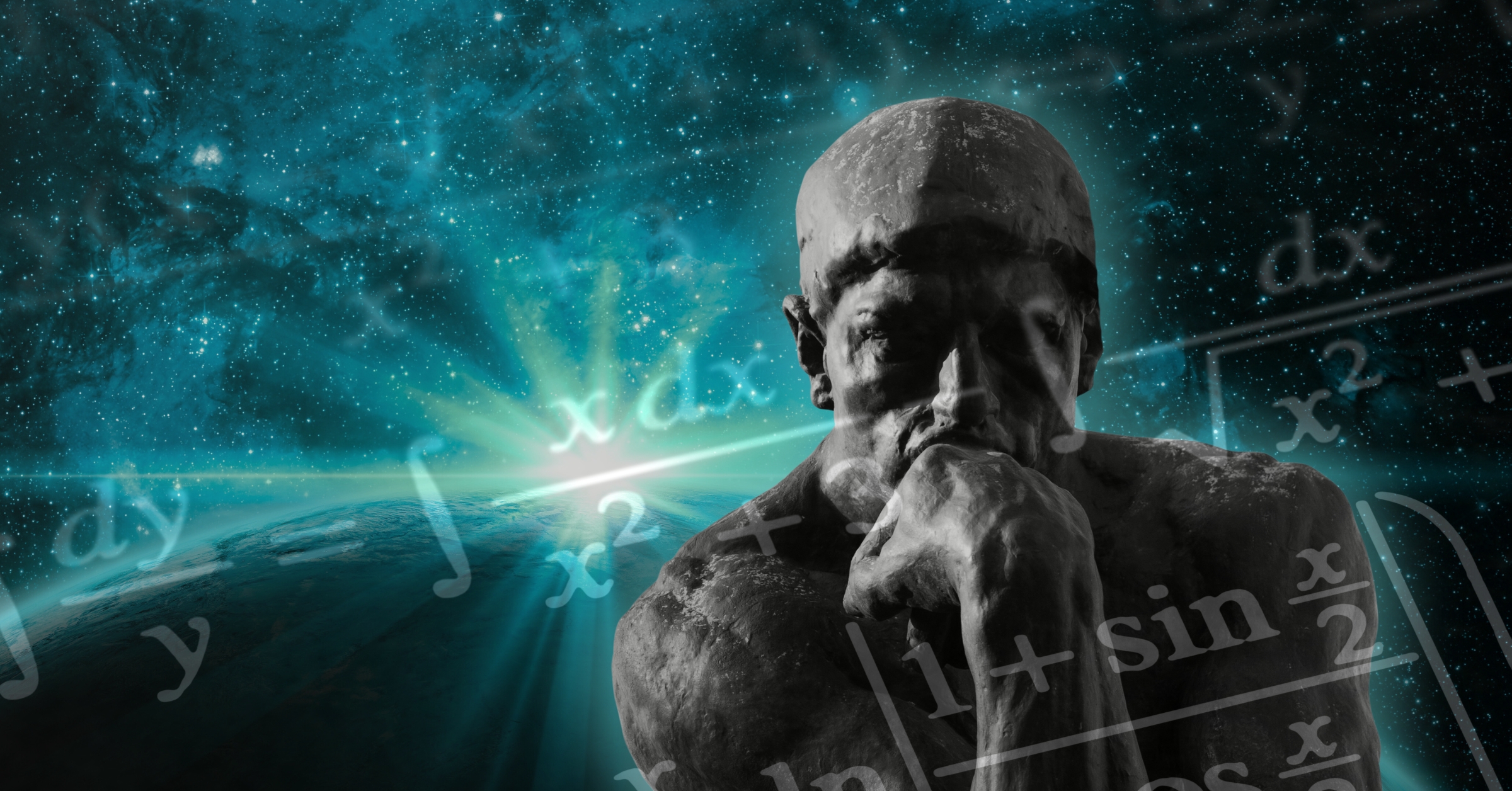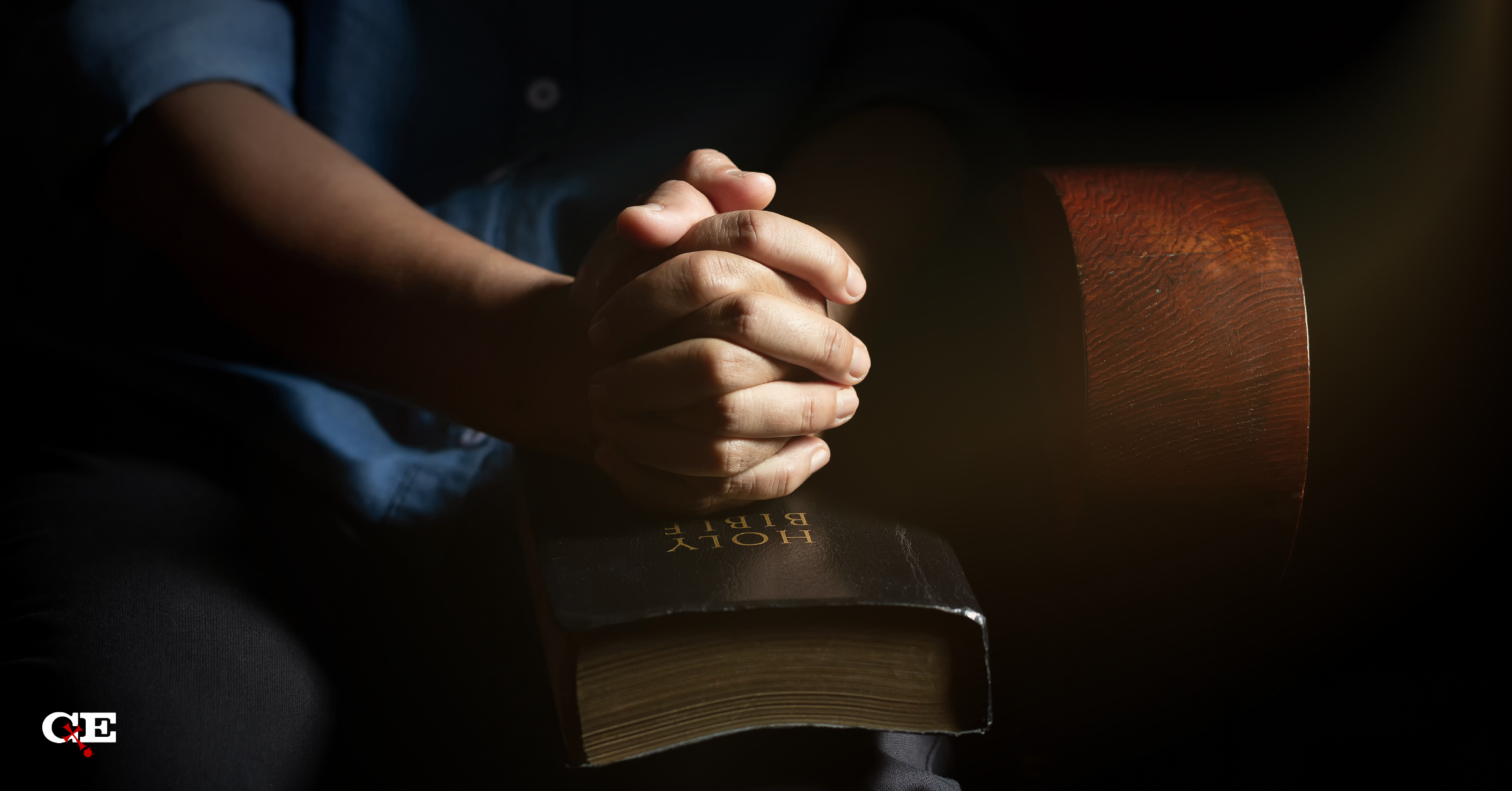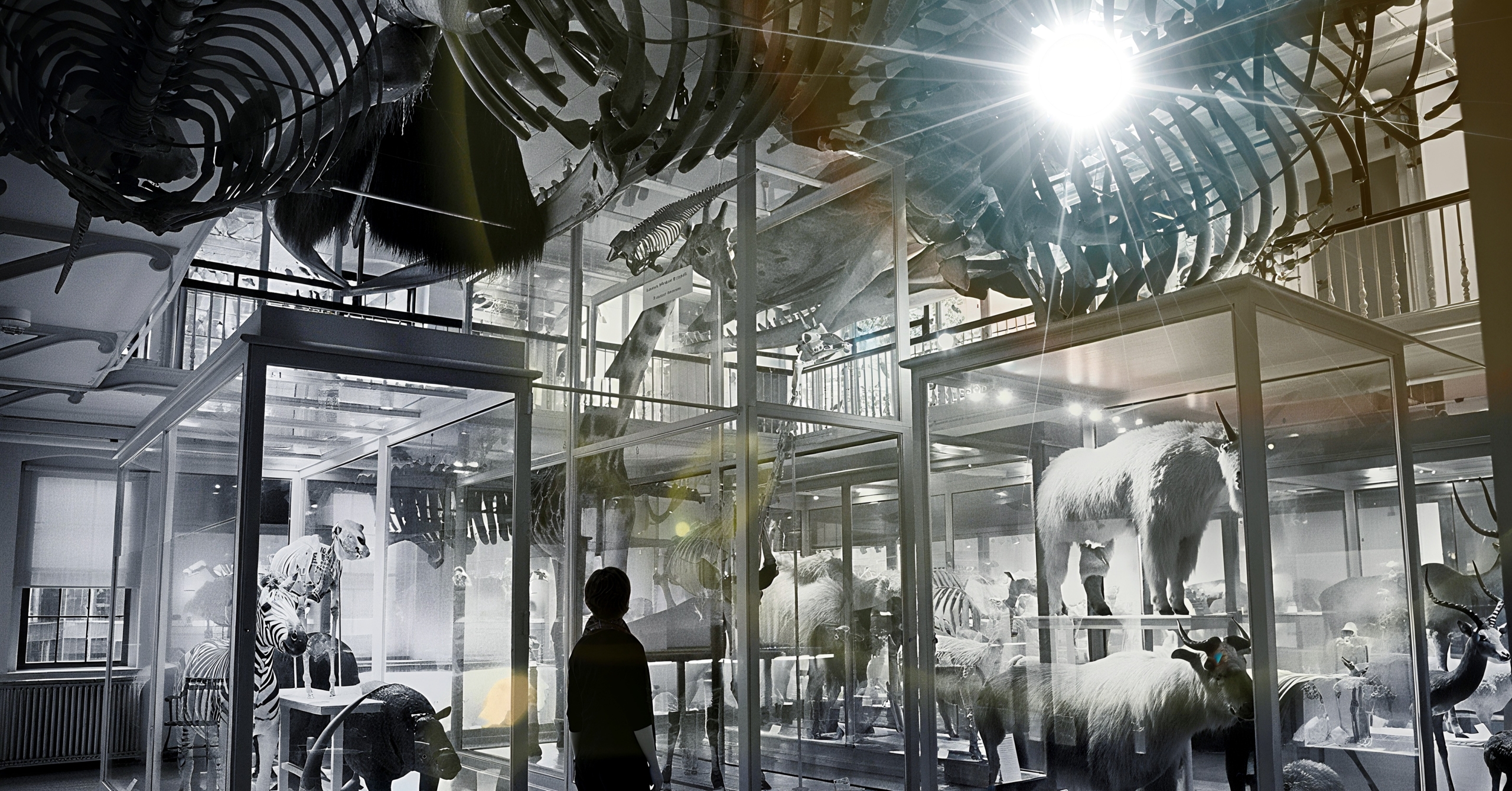[Editor’s Note: This blog was originally a single article. For the purposes of reposting it at Crossexamined, it has been divided into two parts. Click here for part 1.
[Excerpt from Part 1:] In this article [series], I . . . discuss the evidence that the apostles did in fact encounter hardships, dangers and persecutions on account of their Christian convictions. [In part 1] I survey the evidence for a general context of persecution (what may be called the indirect part of the case). [In Part 2] I will . . . proceed to argue that the apostles in particular voluntarily submitted themselves to danger, hardship and persecution on account of their conviction of the gospel’s truth.
The Persecution of the Apostles — Evidence from the Apostolic Fathers
We now turn to what may be called the more direct evidence — that is, the sources which indicate that not only was there a general persecution (and thus a reasonable expectation of danger) but that the apostles themselves voluntarily underwent sufferings and hardships on account of the gospel. Our first evidence is Paul’s statement in his letter to the church in Corinth (dating to around 53 C.E.), that
I think God has exhibited us apostles as last of all, like men sentenced to death, because we have become a spectacle to the world, to angels, and to men. We are fools for Christ’s sake, but you are wise in Christ. We are weak, but you are strong. You are held in honor, but we in disrepute. To the present hour, we hunger and thirst, we are poorly dressed and buffeted and homeless, and we labor, working with our own hands. When reviled, we bless; when persecuted, we endure; when slandered, we entreat. We have become, and are still, like the scum of the world, the refuse of all things (1 Cor. 4:9-13).
This indicates the peril encountered by the original apostles as they labored for the gospel.
Our earliest source, which relates the martyrdom of Peter, is John 21:18: “Truly, truly, I say to you, when you were young, you used to dress yourself and walk wherever you wanted, but when you are old, you will stretch out your hands, and another will dress you and carry you where you do not want to go.” John adds, “This he said to show by what kind of death he was to glorify God,” (v. 19). Though it takes the form of a prophecy attributed to Jesus, it seems unlikely (whether we take this saying to be authentic or not) that John would have attributed such a prediction to Jesus if Peter had not, in fact, died as a martyr (the early church held that John’s gospel was the last to be written, and it was likely composed towards the end of the first century).[1]
Towards the end of the first century, Clement of Rome wrote a letter to the church in Corinth. He wrote (1 Clement 5),
But not to dwell upon ancient examples, let us come to the most recent spiritual heroes. Let us take the noble examples furnished in our own generation. Through envy and jealousy, the greatest and most righteous pillars [of the Church] have been persecuted and put to death. Let us set before our eyes the illustrious apostles. Peter, through unrighteous envy, endured not one or two, but numerous labors; and when he had at length suffered martyrdom, departed to the place of glory due to him. Owing to envy, Paul also obtained the reward of patient endurance, after being seven times thrown into captivity, compelled to flee, and stoned. After preaching both in the east and west, he gained the illustrious reputation due to his faith, having taught righteousness to the whole world, and come to the extreme limit of the west, and suffered martyrdom under the prefects. Thus was he removed from the world, and went into the holy place, having proved himself a striking example of patience.[2]
Irenaeus of Lyons writes concerning Clement,
This man, as he had seen the blessed apostles, and had been conversant with them, might be said to have the preaching of the apostles still echoing [in his ears], and their traditions before his eyes. Nor was he alone [in this], for there were many still remaining who had received instructions from the apostles (Against Heresies 3.3.3).[3]
Clement is plausibly alluded to by Paul himself in Philippians 4:3 (Paul wrote this epistle from Rome, and so there is a high likelihood this is the same Clement). Given Clement’s personal connection to the apostles, he was thus in an ideal position to know about their persecution and ultimate fate.
Another important source is Polycarp of Smyrna (69-155 C.E.). Like Clement, we have one surviving letter of Polycarp’s, which is his letter to the Philippians (dating to around 110 C.E.). In chapter 9 of this letter, we read,
I exhort you all, therefore, to yield obedience to the word of righteousness, and to exercise all patience, such as ye have seen [set] before your eyes, not only in the case of the blessed Ignatius, and Zosimus, and Rufus, but also in others among yourselves, and in Paul himself, and the rest of the apostles. [This do] in the assurance that all these have not run in vain, but in faith and righteousness, and that they are [now] in their due place in the presence of the Lord, with whom also they suffered. For they loved not this present world, but Him who died for us, and for our sakes was raised again by God from the dead.[4]
Like Clement, Polycarp was also personally connected to the apostles. Irenaeus, himself a disciple of Polycarp, informs us that
Polycarp also was not only instructed by apostles, and conversed with many who had seen Christ, but was also, by apostles in Asia, appointed bishop of the Church in Smyrna, whom I also saw in my early youth, for he tarried [on earth] a very long time, and, when a very old man, gloriously and most nobly suffering martyrdom, departed this life, having always taught the things which he had learned from the apostles, and which the Church has handed down, and which alone are true.[5]
Irenaeus, in a fragment preserved in an quotation by Eusebius from a now-lost work, even recalls “how he would speak of his familiar intercourse with John, and with the rest of those who had seen the Lord; and how he would call their words to remembrance.”[6] Polycarp, therefore, was likewise close up to the facts and in a position to be informed regarding the fate of the apostles.
The Persecution of Paul — The Value of the Epistles
We now turn to what may be deduced about the persecution experienced by the apostle Paul from his own letters. Consider Paul’s list of his experiences in 2 Corinthians 11:24-27:
Five times I received at the hands of the Jews the forty lashes less one. 25 Three times I was beaten with rods. Once I was stoned. Three times I was shipwrecked; a night and a day I was adrift at sea; 26 on frequent journeys, in danger from rivers, danger from robbers, danger from my own people, danger from Gentiles, danger in the city, danger in the wilderness, danger at sea, danger from false brothers; 27 in toil and hardship, through many a sleepless night, in hunger and thirst, often without food, in cold and exposure.
Paul also expresses in 1 Corinthians 4:9-13:
9 For I think that God has exhibited us apostles as last of all, like men sentenced to death, because we have become a spectacle to the world, to angels, and to men. 10 We are fools for Christ’s sake, but you are wise in Christ. We are weak, but you are strong. You are held in honor, but we in disrepute. 11 To the present hour we hunger and thirst, we are poorly dressed and buffeted and homeless, 12 and we labor, working with our own hands. When reviled, we bless; when persecuted, we endure; 13 when slandered, we entreat. We have become, and are still, like the scum of the world, the refuse of all things.
Paul, moreover, writes to the Thessalonians, “But though we had already suffered and been shamefully treated at Philippi, as you know, we had boldness in our God to declare to you the gospel of God in the midst of much conflict,” (1 Thess 2:2, emphasis added). This raises the question of how the Thessalonians knew about Paul’s shameful treatment in Philippi. When we compare Paul’s letter to the account in Acts, we learn that the shameful treatment to which he was referring is his imprisonment and public beating, uncondemned, despite being a Roman citizen (Acts 16:16-40). We read in Acts 16:35-40:
But when it was day, the magistrates sent the police, saying, “Let those men go.” 36 And the jailer reported these words to Paul, saying, “The magistrates have sent to let you go. Therefore come out now and go in peace.” 37 But Paul said to them, “They have beaten us publicly, uncondemned, men who are Roman citizens, and have thrown us into prison; and do they now throw us out secretly? No! Let them come themselves and take us out.” 38 The police reported these words to the magistrates, and they were afraid when they heard that they were Roman citizens. 39 So they came and apologized to them. And they took them out and asked them to leave the city. 40 So they went out of the prison and visited Lydia. And when they had seen the brothers, they encouraged them and departed.
According to Acts 17:1, Paul’s very next port of call, after passing through Amphipolis and Apollonia, was Thessalonica. This was in fact on a major Roman highway (the Via Egnatia) and Amphipolis and Apollonia were overnight stops along that highway. One can envision Paul coming from Philippi to Thessalonica, still full of indignation, and reporting about his shameful treatment to the converts in Thessalonica. This undesigned coincidence between Acts and 1 Thessalonians is all the more striking given that the book of Acts does not appear to be dependent upon 1 Thessalonians, nor vice versa. For example, according to 1 Thessalonians 1:9, Paul writes, “For they themselves report concerning us the kind of reception we had among you, and how you turned to God from idols to serve the living and true God…” Notice the emphasis in this text on the conversion of pagans from idolatry. Acts, on the other hand, emphasizes the conversion of Jews and gentile God-fearers (Acts 17:4). If the author of Acts were using 1 Thessalonians as a source, we might expect emphasis to be placed on the conversion of pagans. The accounts are, of course, not mutually exclusive. In fact, there are allusions in the epistle to concepts that would not make much sense to gentiles who lacked acquaintance with Jewish eschatological thought (1 Thess 4:14-17). Paul also distinguishes believers from gentiles, whose ways they ought not copy (1 Thess 4:4-5). It makes sense, therefore, to understand the “you” that turned to God from idols to be an exaggerated statement — referring to one portion of his audience rather than another. Nonetheless, the surface discrepancy between Acts and 1 Thessalonians points to the independence of these sources.
We also read in Acts 17 about the persecution endured by Paul from a mob of Jews who stirred up trouble for him. According to Acts 17:5-9:
5 But the Jews were jealous, and taking some wicked men of the rabble, they formed a mob, set the city in an uproar, and attacked the house of Jason, seeking to bring them out to the crowd. 6 And when they could not find them, they dragged Jason and some of the brothers before the city authorities, shouting, “These men who have turned the world upside down have come here also, 7 and Jason has received them, and they are all acting against the decrees of Caesar, saying that there is another king, Jesus.” 8 And the people and the city authorities were disturbed when they heard these things. 9 And when they had taken money as security from Jason and the rest, they let them go.
Paul thus had to leave in haste to go to Berea (Acts 17:10). We read in Acts 17:13 that “when the Jews from Thessalonica learned that the word of God was proclaimed by Paul at Berea also, they came there too, agitating and stirring up the crowds.” Paul thus, again, had to leave in haste to travel to Athens — “Then the brothers immediately sent Paul off on his way to the sea, but Silas and Timothy remained there. Those who conducted Paul brought him as far as Athens, and after receiving a command for Silas and Timothy to come to him as soon as possible, they departed.” Acts leaves unexplained why Paul left behind Silas and Timothy. This unexplained allusion is itself a hallmark of verisimilitude in the text. It is the texture of testimony — one does not typically leave loose ends like this in a fictitious work. Moreover, Silas and Timothy are instructed to rejoin Paul “as soon as possible.” Presumably, then, they did rejoin Paul in Athens (though the text does not indicate explicitly). Nonetheless, they are next reported to rejoin Paul not in Athens but in Corinth — and they arrived not from Athens but from Macedonia, where the cities of Thessalonica and Berea are (Acts 18:5). What accounts for this gap in the text? An explanation is provided by 1 Thessalonians 3:1-5:
Therefore when we could bear it no longer, we were willing to be left behind at Athens alone, 2 and we sent Timothy, our brother and God’s coworker in the gospel of Christ, to establish and exhort you in your faith, 3 that no one be moved by these afflictions. For you yourselves know that we are destined for this. 4 For when we were with you, we kept telling you beforehand that we were to suffer affliction, just as it has come to pass, and just as you know. 5 For this reason, when I could bear it no longer, I sent to learn about your faith, for fear that somehow the tempter had tempted you and our labor would be in vain.
Thus, Paul indicates, under the circumstances, he had been concerned for the wellbeing of the Christians in Thessalonica, and so he commissioned Timothy to go back from Athens to Thessalonica to check on the believers there. This explains the gap in the account in Acts, and thereby corroborates the account in Acts. This undesigned coincidence is, again, all the more striking given the independence (as I have shown) between Acts and 1 Thessalonians. Connected to this, there is another undesigned coincidence relating to Paul’s time in Corinth (Acts 18:1-5):
After this Paul left Athens and went to Corinth. 2 And he found a Jew named Aquila, a native of Pontus, recently come from Italy with his wife Priscilla, because Claudius had commanded all the Jews to leave Rome. And he went to see them, 3 and because he was of the same trade he stayed with them and worked, for they were tentmakers by trade. 4 And he reasoned in the synagogue every Sabbath, and tried to persuade Jews and Greeks. 5 When Silas and Timothy arrived from Macedonia, Paul was occupied with the word, testifying to the Jews that the Christ was Jesus.
Paul encounters Aquila and Priscilla in Corinth, who had been exiled from Rome at the instigation of the emperor Claudius. The Roman biographer Suetonius also mentions this episode: “He [Claudius] banished from Rome all the Jews, who were continually making disturbances at the instigation of one Chrestus,” (Life of Claudius 25). Our text in Acts indicates that Paul worked with them as a tentmaker to earn his keep during the week, and that he engaged in his evangelistic work on the Sabbath day, when he went into the synagogue and tried to persuade Jews and Greeks that Jesus is the Christ. However, in response to the arrival of Silas and Timothy from Macedonia, he changed his ministry model such that he devoted himself entirely to the work of the ministry. What prompted this change? Acts does not inform us. However, we read in 2 Corinthians 11:7-9:
Or did I commit a sin in humbling myself so that you might be exalted, because I preached God’s gospel to you free of charge? 8 I robbed other churches by accepting support from them in order to serve you. 9 And when I was with you and was in need, I did not burden anyone, for the brothers who came from Macedonia supplied my need. So I refrained and will refrain from burdening you in any way.
Apparently the brothers who came from Macedonia (whom we learn from Acts included Silas and Timothy) brought financial aid to Paul, which enabled him to devote himself entirely to the ministry. This detail, however, is not supplied by Acts. This is further corroborated by Philippians 4:14-16, in which we read (in a letter addressed to one of the churches in Macedonia),
14 Yet it was kind of you to share my trouble. 15 And you Philippians yourselves know that in the beginning of the gospel, when I left Macedonia, no church entered into partnership with me in giving and receiving, except you only. 16 Even in Thessalonica you sent me help for my needs once and again.
This, once again, serves to confirm the account in Acts — which reveals that Paul was willing to work for his keep as a tentmaker. In other words, he was evidently not in ministry for the purpose of extorting people for money. Moreover, the account in Acts continues with a note about another episode of opposition against Paul: “And when they opposed and reviled him, he shook out his garments and said to them, ‘Your blood be on your own heads! I am innocent. From now on I will go to the Gentiles,’” (Acts 18:6). This coincidence is all the more striking given the independence of Acts and 2 Corinthians, as demonstrated earlier in this article.
Another undesigned coincidence bearing on Paul’s sufferings relates to Paul’s statement in 2 Timothy 3:10-11:
10 You, however, have followed my teaching, my conduct, my aim in life, my faith, my patience, my love, my steadfastness, 11 my persecutions and sufferings that happened to me at Antioch, at Iconium, and at Lystra—which persecutions I endured; yet from them all the Lord rescued me.
The sufferings mentioned here are described in Acts 13:50-51 and 14:1-7, 19-21. Paul seems to imply, in his letter to Timothy, that Timothy had in fact witnessed the persecutions that he had endured in those cities. According to Acts, Paul embarked on a second missionary journey through the same country as the first journey. The purpose of his second missionary trip is given in Acts 15:36: “Let us return and visit the brothers in every city where we proclaimed the word of the Lord, and see how they are.” Thus, we learn, that the purpose of the journey was to check on those who had been converted during the first journey, to see how they were doing. In Acts 16;1-2, we further learn, “Paul came also to Derbe and to Lystra. A disciple was there, named Timothy, the son of a Jewish woman who was a believer, but his father was a Greek. 2 He was well spoken of by the brothers at Lystra and Iconium.” We are thereby informed that Timothy’s hometown was either Derbe or Lystra. And it is apparent from the text that Timothy had already been converted by this time. Paul himself refers to Timothy as “my true child in the faith” (1 Tim 1:2) and “my beloved child” (2 Tim 1:2). This implies that Timothy was probably Paul’s own convert. It then follows that Timothy was very likely converted during Paul’s preceding missionary journey through these cities, at the very time when Paul had undergone the persecutions referred to in the epistle. This supports both the historicity of Acts, as well as the genuineness of the pastoral epistles (which are among the disputed Pauline letters). For a more detailed discussion of the authenticity of the pastoral epistles, see my essay here.
There is also external evidence that corroborates the accounts in Acts concerning Paul’s suffering for the gospel. For example, Acts 22:25-29 describes Paul being before the Roman tribune:
But when they had stretched him out for the whips, Paul said to the centurion who was standing by, “Is it lawful for you to flog a man who is a Roman citizen and uncondemned?” 26 When the centurion heard this, he went to the tribune and said to him, “What are you about to do? For this man is a Roman citizen.” 27 So the tribune came and said to him, “Tell me, are you a Roman citizen?” And he said, “Yes.” 28 The tribune answered, “I bought this citizenship for a large sum.” Paul said, “But I am a citizen by birth.” 29 So those who were about to examine him withdrew from him immediately, and the tribune also was afraid, for he realized that Paul was a Roman citizen and that he had bound him. [emphasis added]
Note the tribune’s words to Paul, “I bought this citizenship for a large sum.” What is the historical background here? The second century Roman historian Cassius Dio informs us that, during the reign of Claudius it was introduced that one could purchase a Roman citizenship for a great sum. He writes (Historiae Romanae 60.17) [15],
For inasmuch as Romans had the advantage over foreigners in practically all respects, many sought the franchise by personal application to the emperor, and many bought it from Messalina and the imperial freedmen. For this reason, though the privilege was at first sold only for large sums, it later became so cheapened by the facility with which it could be obtained that it came to be a common saying, that a man could become a citizen by giving the right person some bits of broken glass.[7]
Thus, though the privilege of Roman citizenship sold at first for great sums of money, the price progressively came down, until it had become so cheapened that it came to be a common saying that one could become a Roman citizen by bringing the right person some pieces of broken glass. This adds color to the tribune’s words, “I bought this citizenship for a large sum,” insinuating that Paul was able to acquire his citizenship for much less. Paul, in turn, corrects the tribune that he was a citizen by birth. Acts does not explain, for the sake of his readers, this historical background. Cassius Dio, in providing this background, renders the narrative in Acts quite credible.
There is also a wealth of evidence for the authenticity of Paul’s voyage, as a prisoner bound for Rome, that ended in shipwreck (Acts 27). The report of that voyage notes, in verses 3-6, that,
3 The next day we put in at Sidon. And Julius treated Paul kindly and gave him leave to go to his friends and be cared for. 4 And putting out to sea from there we sailed under the lee of Cyprus, because the winds were against us. 5 And when we had sailed across the open sea along the coast of Cilicia and Pamphylia, we came to Myra in Lycia. 6 There the centurion found a ship of Alexandria sailing for Italy and put us on board.
Colin Hemer comments, “Myra, like Patara again, was a principal port for the Alexandrian corn-ships, and precisely the place where Julius would expect to find a ship sailing to Italy in the imperial service. Its official standing here is further illustrated by the Hadrianic granary. Myra was also the first of these ports to be reached by a ship arriving from the east, as Patara had been previously from the reverse direction.”[8]
Verses 13-14 indicate that they “…sailed along Crete, close to the shore. But soon a tempestuous wind, called the northeaster, struck down from the land.” In confirmation of Luke’s report, there is indeed a well confirmed wind that rides over Crete from the Northeast, and which is strongest at this exact time near the Day of Atonement in the Fall (Acts 27:9). Acts 27:16 describes how the ship was blown off course towards a small island called Cauda. What is impressive is that the island of Cauda is more than 20 miles west-southwest of where the storm likely struck the travelers in the Bay of Messara. This is precisely where the trajectory of a north-easterly wind should have carried them, and it is not the sort of information someone would have inferred without having been blown there. Ancients found it nearly impossible to properly locate islands this far out. Colin Hemer notes that,
As the implications of such details are further explored, it becomes increasingly difficult to believe that they could have been derived from any contemporary reference work. In the places where we can compare, Luke fares much better than the encyclopaedist Pliny, who might be regarded as the foremost first-century example of such a source. Pliny places Cauda (Gaudos) opposite Hierapytna, some ninety miles too far east (NH 4.12.61). Even Ptolemy, who offers a reckoning of latitude and longitude, makes a serious dislocation to the northwest, putting Cauda too near the western end of Crete, in a position which would not suit the unstudied narrative of our text (Ptol. Geog. 3.15.8).[9]
There are many other points at which Paul’s voyage and shipwreck may be confirmed. For a much more detailed discussion, I refer readers to James Smith’s book, The Voyage and Shipwreck of St. Paul.[10]
Paul rejoiced in his own sufferings for the name of Christ. He wrote to the Philippians, “Even if I am to be poured out as a drink offering upon the sacrificial offering of your faith, I am glad and rejoice with you all. Likewise you also should be glad and rejoice with me,” (Phil 2:17-18).
An additional point that bears mentioning is that Paul not only willingly endured hardships and persecutions himself, but he expected other believers to do the same. Consider the following texts:
- Philippians 1:29-30: For it has been granted to you that for the sake of Christ you should not only believe in him but also suffer for his sake, engaged in the same conflict that you saw I had and now hear that I still have.
- 1 Thessalonians 1:4-5: For when we were with you, we kept telling you beforehand that we were to suffer affliction, just as it has come to pass, and just as you know. For this reason, when I could bear it no longer, I sent to learn about your faith, for fear that somehow the tempter had tempted you and our labor would be in vain. This is evidence of the righteous judgment of God, that you may be considered worthy of the kingdom of God, for which you are also suffering.
- 2 Thessalonians 1:4: Therefore we ourselves boast about you in the churches of God for your steadfastness and faith in all your persecutions and in the afflictions that you are enduring.
- Romans 3:3-4: Not only that, but we rejoice in our sufferings, knowing that suffering produces endurance, and endurance produces character, and character produces hope.
- Romans 8:35-36: Who shall separate us from the love of Christ? Shall tribulation, or distress, or persecution, or famine, or nakedness, or danger, or sword? As it is written, “For your sake we are being killed all the day long; we are regarded as sheep to be slaughtered.”
- 2 Corinthians 6:4-10: but as servants of God we commend ourselves in every way: by great endurance, in afflictions, hardships, calamities, beatings, imprisonments, riots, labors, sleepless nights, hunger; by purity, knowledge, patience, kindness, the Holy Spirit, genuine love; by truthful speech, and the power of God; with the weapons of righteousness for the right hand and for the left; through honor and dishonor, through slander and praise. We are treated as impostors, and yet are true; as unknown, and yet well known; as dying, and behold, we live; as punished, and yet not killed; as sorrowful, yet always rejoicing; as poor, yet making many rich; as having nothing, yet possessing everything.
Sir George Lyttelton notes,
But at that time when St. Paul undertook the preaching of the Gospel to persuade any man to be a Christian, was to persuade him to expose himself to all the calumnies human nature could suffer. This St Paul knew; this he not only expected, but warned those he taught to look for it too… How much reason he had to say this, the hatred, the contempt, the torments, the deaths endured by the Christians in that age, and long afterwards, abundantly prove. Whoever professed the Gospel under these circumstances, without an entire conviction of its being a Divine revelation, must have been mad; and if he made others profess it by fraud or deceit, he must have been worse than mad; he must have been the most hardened wretch that ever breathed. Could any man who had in his nature the least spark of humanity, subject his fellow-creatures to so many miseries; or could one that had in his mind the least ray of reason, expose himself to share them with those he deceived, in order to advance a religion which he knew to be false, merely for the sake of its moral doctrines? Such an extravagance is too absurd to be supposed; and I dwell too long on a notion that upon a little reflection confutes itself.[11]
Short of being, as Lyttelton put it, the most hardened wretch that ever breathed, how could Paul expect his fellow believers to voluntarily undertake tremendous hardships and sufferings, even martyrdom, unless he had a sincere conviction of the gospel’s truth?
The Accounts in Acts
We now turn to the accounts of persecution in the book of Acts. For economy of space, I shall not regurgitate here the extensive case that I and others have made elsewhere for the high reliability of the book of Acts (though the points of internal and external confirmation given above contribute to this case). This case, though, confirms the author to have been an individual who was very well informed, close up to the facts, and in the habit of being scrupulous. We must, therefore, take what he says concerning the context of persecution — and, in particular, about the persecution of the early apostles, and their resoluteness to continue preaching despite this danger — quite seriously.
The author of Acts (i.e., Luke) provides a list in his opening chapter of the eleven disciples (Acts 1:13), even though he already supplied a list of the Twelve in his gospel (Luke 6:12-16). Moreover, in Acts 1:15-26, we read about a replacement for Judas being elected, because there had to be no fewer than twelve men who could bear witness to Jesus’ resurrection (Matthias is elected out of two candidates, the other contender being Joseph called Barsabbas). This confirms that, even in this very early period following Jesus’ resurrection and ascension, the twelve were acting in leadership capacities in Jerusalem.
In Acts 2:14, we learn that Peter stood up “with the eleven” at Pentecost to address the Jews in Jerusalem. This includes a clear proclamation of Jesus’ resurrection (v. 24, 32). In verse 37, we read that “when they [the Jews in Jerusalem] heard this they were cut to the heart, and said to Peter and the rest of the apostles, ‘Brothers, what shall we do?’” Notice that this is addressed to Peter along with “the rest of the apostles.” In view of verse 14, this has to include all of the eleven. We may glean from this, then, that the twelve collectively declared the reality of Christ’s resurrection at Pentecost, and that they intended to have an ongoing leadership role that would be focused on proclaiming the resurrection. Even by this point, the twelve were taking upon themselves tremendous risks on account of the gospel. This was only six weeks since Jesus himself had been put to death at the instigation of the Jewish authorities. As Paley notes,
The ruling party at Jerusalem had just before crucified the Founder of the religion. That is a fact which will not be disputed. They, therefore, who stood forth to preach the religion must necessarily reproach these rulers with an execution, which they could not but represent as an unjust and cruel murder. This would not render their office more easy, or their situation more safe.[12]
And that they did. Peter’s speech, as reported in Acts, is very confrontational, repudiating the Jewish leaders for their rejection of their Messiah and their part in his execution. Consider the provocative nature of Peter’s statements:
This Jesus, delivered up according to the definite plan and foreknowledge of God, you crucified and killed by the hands of lawless men. God raised him up, loosing the pangs of death, because it was not possible for him to be held by it… Let all the house of Israel therefore know for certain that God has made him both Lord and Christ, this Jesus whom you crucified (Acts 2:23,36).
In verses 41-47, we learn that the apostles continued to minister publicly following Peter’s speech.
Acts 5:12 informs us that “many signs and wonders were regularly done among the people by the hands of the apostles. And they were all together in Solomon’s portico.” This indicates that Solomon’s Porch was a location where the apostles would commonly meet (as alluded to previously in Acts 3:11, and during Jesus’ own ministry according to John 10:23). According to Acts 5:17-18, the apostles were arrested and imprisoned by the high priest and Sadducees. That same night, they were liberated by an angel and they resumed their preaching work. In verse 28, the high priest cautions them, “We strictly charged you not to teach in this name, yet here you have filled Jerusalem with your teaching, and you intend to bring this man’s blood upon us.” Peter replies,
We must obey God rather than men. The God of our fathers raised Jesus, whom you killed by hanging him on a tree. God exalted him at his right hand as Leader and Savior, to give repentance to Israel and forgiveness of sins. And we are witnesses to these things, and so is the Holy Spirit, whom God has given to those who obey him (Acts 5:29-32).
Verse 40 indicates that “when they had called in the apostles, they beat them and charged them not to speak in the name of Jesus, and let them go.” However, in spite of this warning, “every day, in the temple and from house to house, they did not cease teaching and preaching that the Christ is Jesus,” (v. 42). We are even told that “they left the presence of the council, rejoicing that they were counted worthy to suffer dishonor for the name,” (v. 41).
In the following chapter we learn that “the twelve summoned the full number of the disciples and said, ‘It is not right that we should give up preaching the word of God to serve tables.” Seven individuals are selected to deal with this issue, for the reason that the chief focus of the twelve is preaching the word of God (v. 2) — prayer and the ministry of the word (v. 4).
Acts 7 recounts the stoning of Stephen, who was one of the appointed deacons. Though he was not himself one of the apostles (and was not, so far as we know, a witness to Jesus’ resurrection), his death by stoning would have served as a warning shot regarding the dangers that were associated with proclamation of the gospel in those early years. If the resurrection were a conspiracy, one would expect that some members of what must have been a relatively large conspiracy, would have cold feet about continuing. And yet, there is no record whatsoever about any of the apostles abandoning Christianity in those early years when we would most expect there to be some record of such a defection. Early Christian writers were not shy about calling out by name others who fell away. In 2 Timothy 4:10, Paul writes that “Demas, in love with this present world, has deserted me and gone to Thessalonica.” He further notes “You are aware that all who are in Asia turned away from me, among whom are Phygelus and Hermogenes,” (2 Tim 1:15). Nowhere is there a record rebuking one of the original apostles for falling away from the faith, though they had every incentive to do so if they knew Christianity to be false.
We read in the following chapter of Acts that “there arose on that day a great persecution against the church in Jerusalem, and they were all scattered throughout the regions of Judea and Samaria, except the apostles,” (Acts 8:1). The text therefore clearly distinguishes between those other believers who were “scattered throughout the regions of Judea and Samaria,” and the apostles who remained in Jerusalem amidst the context of persecution.
In Acts 12:1-3, we learn,
About that time Herod the king laid violent hands on some who belonged to the church. He killed James the brother of John with the sword, and when he saw that it pleased the Jews, he proceeded to arrest Peter also. This was during the days of Unleavened Bread. And when he had seized him, he put him in prison, delivering him over to four squads of soldiers to guard him, intending after the Passover to bring him out to the people. So Peter was kept in prison, but earnest prayer for him was made to God by the church.
The “Herod” referred to here is Herod Agrippa I, the son of Aristobulus and grandfather of Herod the Great. This account accords quite well with the character of Herod Agrippa I, as recorded by Josephus. In Antiquities 19.7.3, Josephus writes about Herod Agrippa’s character [21]:
But Agrippa’s temper was mild, and equally liberal to all men. He was humane to foreigners, and made them sensible of his liberality. He was in like manner rather of a gentle and compassionate temper. Accordingly, he loved to live continually at Jerusalem, and was exactly careful in the observance of the laws of his country. He therefore kept himself entirely pure: nor did any day pass over his head without its appointed sacrifice.[13]
Thus, Herod Agrippa I was particularly concerned about pleasing the Jews. This account of Agrippa’s character, therefore, dovetails with the account in Acts 12:3, which indicates that he proceeded to arrest Peter when he saw that it pleased the Jews.
The Martyrdom of James the Brother of Jesus
Josephus also informs us about the martyrdom of the other James, i.e., the brother of Jesus. He writes (Antiquities 20.9.1):
Festus was now dead, and Albinus was but upon the road; so he assembled the Sanhedrin of judges, and brought before them the brother of Jesus, who was called Christ, whose name was James, and some others, [or, some of his companions]; and when he had formed an accusation against them as breakers of the law, he delivered them to be stoned.[14]
Craig Evans notes concerning this text that “There are no compelling reasons for rejecting this passage as inauthentic. There is nothing Christian, or positive, in the reference to James and Jesus. The whole point seems to be to explain why Ananus was deposed as High Priest. Furthermore, the designation, ‘brother of Jesus,’ contrasts with Christian practice of referring to James as the ‘brother of the Lord’ (cf. Gal 1:19; Eusebius, Hist. Eccl. 2.23.4).”[15] Evans concludes, “It is not surprising, therefore, that, in the words of Louis Feldman, ‘few have doubted the genuineness of this passage on James.’”[16]
Implications for Jesus’ Resurrection
What are the implications of all this for Jesus’ resurrection and the broader set of arguments for Christianity? The fact that the original apostles were willing to voluntarily undergo and endure hardships, dangers, and sufferings on account of the gospel goes a very long way towards establishing their sincerity. This drastically reduces the plausibility of one of three candidate explanations for the origins of early Christian belief in the resurrection — namely, that the apostles were lying about Jesus’ resurrection and other miracles with an intent to deceive. With this explanation off the table, the probabilities are redistributed between the two remaining options — i.e., that the apostles were somehow sincerely mistaken, or else the content of their testimony is true.
If it is the case (as I have argued in detail elsewhere) that the accounts that we have in the gospels and Acts in fact represent the testimony of eyewitnesses to Jesus’ ministry and, in particular, purported witnesses to Jesus’ resurrection, then this renders it quite implausible that the apostles were sincerely mistaken. The apostles are alleged to have encountered Jesus, alive after his death, at close quarters. They engaged with him in group conversations, were invited to touch him (Luke 24:39; John 20:27), handed Jesus a broiled fish which he ate in their presence (Luke 24:42), and ate and drank with Jesus (Acts 10:41). Moreover, Jesus is alleged to have even cooked breakfast for seven disciples on the shore of the Sea of Galilee (John 21). The experiences are also said to have been distributed over a forty day time period (Acts 1:3). The encounters with the risen Jesus occur in different settings — both indoors and outdoors, with and without prior appointment (see Matthew 28:16). These are not the sort of claims about which one can be plausibly sincerely mistaken.
I have also argued in detail elsewhere that the accounts of Paul’s conversion in Acts 9, 22 and 26 actually represent Paul’s own conversion testimony. This being the case, it is difficult to envision the apostle Paul being mistaken about the sort of claims he makes. His experience is multisensory (involving both a visual and auditory aspect) and intersubjective (affecting both Paul and those travelling with him, who are thrown to the ground). Paul is blinded by the experience and later healed on command by Ananias, who receives a vision concerning Paul, and Paul a vision concerning Ananias. Paul also writes about miracles that he had himself performed, which he describes as “the signs of a true apostle” that “were performed among you with utmost patience, with signs and wonders and mighty works,” (2 Cor 12:12; c.f. Rom 15:18-19). We also read of various of Paul’s miracles in the book of Acts. Given the strong case (as I and others have developed in detail elsewhere) that the book of Acts was written by a traveling companion of Paul, who was well informed and habitually scrupulous, Luke’s most likely source for this material is Paul himself. This is, therefore, part of the testimony that must be accounted for. To take one example, Luke describes a curse that Paul placed on the magician Elymas (who had opposed Paul and Barnabas, seeking to turn the Proconsul away from the faith). Luke writes in Acts 13:9-12,
9 But Saul, who was also called Paul, filled with the Holy Spirit, looked intently at him 10 and said, “You son of the devil, you enemy of all righteousness, full of all deceit and villainy, will you not stop making crooked the straight paths of the Lord? 11 And now, behold, the hand of the Lord is upon you, and you will be blind and unable to see the sun for a time.” Immediately mist and darkness fell upon him, and he went about seeking people to lead him by the hand. 12 Then the proconsul believed, when he saw what had occurred, for he was astonished at the teaching of the Lord.
Among Paul’s other miraculous signs, he healed a man who had been crippled since birth (Acts 14:8-10), was freed from prison by an earthquake (Acts 16:26); healed many sick (Acts 19:11-12), raised Eutychus from the dead after his fall from the third story of a building (Acts 20:9-12), and healed the father of Publius, who lay sick with fever and dysentery, on Malta (Acts 28:7-9). This set of claims is difficult to account for on the supposition that Paul was sincerely mistaken.
Besides miracles performed by the apostle Paul, there are also miracles that are alleged in Acts to have been performed by other individuals. For example, Philip the deacon is said to have performed signs, healings, and exorcisms in Samaria (Acts 8:6-7), and his miracles are said to have impressed Simon the Magician (Acts 8:13). The spirit of the Lord later snatched Philip from the road to Gaza and placed him instead in Azotus (Acts 8:39-40). There is also an occasion of special providence (though not a miracle per se) when Philip encounters the Ethiopian eunuch. Luke’s most probable source for these accounts is Philip himself, particularly given that he apparently stayed at the house of Philip (Acts 21:8). Luke also encountered the original apostles, in particular the Jerusalem leaders James the brother of Jesus, Simon Peter, and John the son of Zebedee (Acts 21:17-18) and was in relatively close proximity for a subsequent two years while in Caesarea Maritima (Acts 24:27). Given the numerous specific details that may be corroborated not only in Acts but also the gospel of Luke, we have every reason to think that not only did Luke have access to eyewitnesses (recall also that he has a stated interest in eyewitness testimony — see Luke 1:1-4) but that he extracted accurate information from those apostles.
Other miracles performed by the apostles in Acts include Peter’s healing of the cripple, which even forces the authorities to recognize a miraculous event (Acts 3:2-10; 4:16,22); various other healings as well as exorcisms attributed to the apostles (Acts 2:43, 5:12-16), Peter’s striking Ananias and Sapphira dead after they lied about the price obtained for their land (Acts 5:1-11); the rescue of the apostles from prison (Acts 5:18-20), Peter’s healing of Aeneas in Lydda (Acts 9:33-34). the raising of Tabitha / Dorcas from the dead (Acts 9:36-41), and the rescue of Peter from prison by an angel (Acts 12:6-11).
There are also various other miracles, aside from the resurrection, that are alleged in the gospel accounts. For example, the disciples are represented as being present for the raising of Lazarus from the dead in Bethany in John 11, and the subsequent dinner with Lazarus along with his sisters, Mary and Martha, in John 12:1-7. There are good reasons to believe the fourth gospel to be written by a disciple of Jesus, and more specifically by John the son of Zebedee — but we will not digress onto that subject here.
My purpose in this last section has not been to defend in detail the crucial premise that these accounts in fact represent the testimony of eyewitnesses (I have offered that defense in detail elsewhere). Rather, it has been simply to show how the case given above for the willingness of the Christians to undergo and endure hardships, dangers and sufferings on account of the gospel fits within the broader set of arguments for Christianity.
References:
[1] Editor’s Note: John’s Gospel is often thought to have been written in the late 1st century, c. 90-95AD, but that view is not unanimous among scholars. An increasingly popular view, in biblical scholarship, proposes a date around 60-70AD, seeJonathan Bernier in Rethinking the Dates of the New Testament: The Evidence for Early Composition (Grand Rapids: Baker, 2022), 87-129, 277.
[2] Clement of Rome, “The First Epistle of Clement to the Corinthians,” in The Apostolic Fathers with Justin Martyr and Irenaeus, ed. Alexander Roberts, James Donaldson, and A. Cleveland Coxe, vol. 1, The Ante-Nicene Fathers (Buffalo, NY: Christian Literature Company, 1885), 6.
[3] Irenaeus of Lyons, “Irenæus against Heresies,” in The Apostolic Fathers with Justin Martyr and Irenaeus, ed. Alexander Roberts, James Donaldson, and A. Cleveland Coxe, vol. 1, The Ante-Nicene Fathers (Buffalo, NY: Christian Literature Company, 1885), 416.
[4] Polycarp of Smryna, “The Epistle of Polycarp to the Philippians,” in The Apostolic Fathers with Justin Martyr and Irenaeus, ed. Alexander Roberts, James Donaldson, and A. Cleveland Coxe, vol. 1, The Ante-Nicene Fathers (Buffalo, NY: Christian Literature Company, 1885), 35.
[5] Irenaeus of Lyons, “Irenæus against Heresies,” in The Apostolic Fathers with Justin Martyr and Irenaeus, ed. Alexander Roberts, James Donaldson, and A. Cleveland Coxe, vol. 1, The Ante-Nicene Fathers (Buffalo, NY: Christian Literature Company, 1885), 416.
[6] Irenaeus of Lyons, “Fragments from the Lost Writings of Irenæus,” in The Apostolic Fathers with Justin Martyr and Irenaeus, ed. Alexander Roberts, James Donaldson, and A. Cleveland Coxe, vol. 1, The Ante-Nicene Fathers (Buffalo, NY: Christian Literature Company, 1885), 568.
[7] Cassius Dio, Dio’s Roman History, trans. Earnest Cary, vol. 7, The Loeb Classical Library (London; New York; Cambridge, MA: The Macmillan Co.; G. P. Putnam’s Sons; Harvard University Press; William Heinemann Ltd, 1914–1927), 411.
[8] Colin J. Hemer, The Book of Acts in the Setting of Hellenistic History, ed. Conrad H. Gempf (Winona Lake, IN: Eisenbrauns, 1990), 134.
[9] Ibid., 331.
[10] James Smith, The Voyage and Shipwreck of St. Paul: With Dissertations on the Life and Writings of St. Luke, and the Ships and Navigation of the Ancients, ed. Walter E. Smith, Fourth Edition, Revised and Corrected (London: Longmans, Green, and Co., 1880).
[11] George Lyttelton, Observations on the Conversion and Apostleship of St. Paul (The Institute Trust, 1747), 36-39.
[12] William Paley, A View of the Evidences of Christianity: Volume 1, Reissue Edition (Cambridge: Cambridge University Press, 2009).
[13] Flavius Josephus and William Whiston, The Works of Josephus: Complete and Unabridged (Peabody: Hendrickson, 1987), 522.
[14] Ibid., 538.
[15] Craig A. Evans, “Jesus in non-Christian sources” in The Historical Jesus, Vol. 4, ed. Craig A. Evans (London and New York: Routledge), 392.
[16] Ibid.
Recommended Resources:
Why We Know the New Testament Writers Told the Truth by Frank Turek (mp4 Download)
The Top Ten Reasons We Know the NT Writers Told the Truth mp3 by Frank Turek
Counter Culture Christian: Is the Bible True? by Frank Turek (Mp3), (Mp4), and (DVD)
The New Testament: Too Embarrassing to Be False by Frank Turek (DVD, Mp3, and Mp4)
Dr. Jonathan McLatchie is a Christian writer, international speaker, and debater. He holds a Bachelor’s degree (with Honors) in forensic biology, a Masters’s (M.Res) degree in evolutionary biology, a second Master’s degree in medical and molecular bioscience, and a Ph.D. in evolutionary biology. Currently, he is an assistant professor of biology at Sattler College in Boston, Massachusetts. Dr. McLatchie is a contributor to various apologetics websites and is the founder of the Apologetics Academy (Apologetics-Academy.org), a ministry that seeks to equip and train Christians to persuasively defend the faith through regular online webinars, as well as assist Christians who are wrestling with doubts. Dr. McLatchie has participated in more than thirty moderated debates around the world with representatives of atheism, Islam, and other alternative worldview perspectives. He has spoken internationally in Europe, North America, and South Africa promoting an intelligent, reflective, and evidence-based Christian faith.
Originally posted at: https://bit.ly/41NinxW

